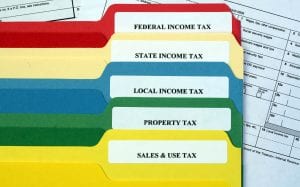
By now you might be getting a better idea on how the Tax Cuts and Jobs Act, which was signed into law on December 22, 2017, by President Donald Trump, will impact your business from a federal standpoint. What you might not have been informed of yet, however, is that there will be state income tax implications as well.
Due to general state conformity with federal tax laws, changes at the federal level will flow to the state level. As a result, state tax bases will either become broadened or diminished. States will ultimately have to review the federal changes and decide whether or not they want to conform or enact “decoupling” modifications, which are generally done to increase their tax base.
Read Also: C Corp Tax Rate Drops To 21%
Below is a look at the more commonly decoupled provisions in the tax bill that will need monitored for state responses to determine treatments going forward:
Business Interest Deduction
The new tax bill limits the interest deduction to 30 percent of earnings before interest, taxes, depreciation and amortization (EBITDA) for the immediate future. The old system generally allowed a full deduction for business interest. Most states previously conformed to the federal business interest deduction. Since that is being limited with the new tax bill, you should expect states to continue to conform as it will broaden their tax base.
Net-Operating Loss Deduction
The tax act also allows an indefinite carryforward of Federal Net Operating Losses (NOLs). The catch is that the deduction will now be subject to a limitation of 80 percent of taxable income. Many states had already decoupled from the Federal NOL provision in some way. States that already have could decide to follow-suit and limit NOLs to a percentage of taxable income, but we don’t see much change in this area from a state perspective. States that previously conformed with the Federal NOL (such as Virginia and Maryland) are the ones to pay attention to going forward as they may decide to decouple, either in the sense of the carryforward allowance or deduction limitation.
Domestic Production Activities Deduction (DPAD)
DPAD was repealed for tax years beginning after 12/31/2017. Conformity to DPAD was pretty evenly split under the old legislation, but you should expect almost 100 percent state conformity going forward as this change will also broaden the state tax base.
Section 179 Expensing
Under previous law, a taxpayer could expense up to $500,000 in qualifying property. That expense allowance was reduced dollar for dollar by the amount the cost of the property exceeded $2 million. Under new law, the expense amount has been increased to $1 million with the expense phase-out threshold now $2.5 million. There were various state tax decoupling methods to Section 179 deductions under old law and this is something we would generally expect to stay the same with probably more states joining in to decouple as this is a change that will diminish state tax bases.
Bonus Depreciation Deduction
The new bill allows for the “full expensing” of 168(k) property. Unlike most other provisions, this one actually went into effect Sept. 27, 2017, rather than in the 2018 tax year. In addition, certain used property will even be allowed to be expensed, whereas the old law only allowed additional expensing for new property. The expense allowance along with the type of property allowed to be expensed will need to be monitored closely going forward on a state by state basis.
As we learned with the federal due date changes for the 2016 tax year, some states are leaders and others are laggards when it comes to change.
Pennsylvania has already issued guidance on the 100 percent depreciation provision with the issuance of PA Corporate Tax Bulletin 2017-02 on Dec. 22, 2017. In the bulletin, the state indicates the 100 percent depreciation deduction must be added back without any current method of cost recovery, meaning the adjustment will not be just a timing difference as it has been in the past, but an unfavorable permanent adjustment.
There appears to be an opportunity to recover this cost at the sale or disposal of the asset, but that be many years from the date of purchase.
Most states are required to maintain balanced budgets. Because of this, we generally expect states to conform to Federal changes where their tax base would be broadened and decouple when the base would otherwise be diminished. States with the luxury of being able to conform to federal provisions that would diminish the tax base may decide to do so in order to attract business investment. Pay attention for state guidance as the year goes on and be mindful as to when the changes go into effect.
Businesses should consult with their tax practitioner to stay on the front end of these and other tax reform considerations to avoid the additional costs of potentially unintended state tax consequences.
To learn more about the state and local implications of the Tax Cuts & Job Act, reach out to me directly at 330.722.6229. You can also email Rea & Associates to be put in touch with a tax expert with proven knowledge of how federal tax reform will impact your business’s state tax liability while providing you with insight into how you might appropriately plan for the future.
By Lamarcus Crowders (Dublin CPA Firm)
